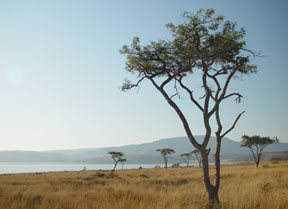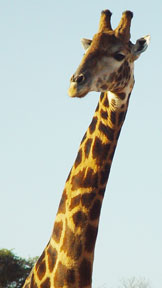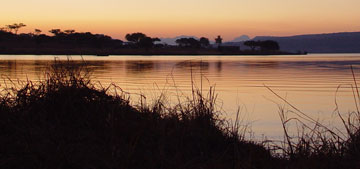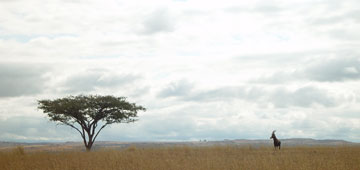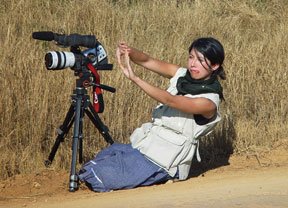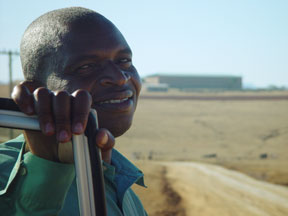In the way that Sarah and I feel no control over where life decides to put us, we were steered completely off course Thursday when a quick trip to the clinic became a six hour shuttle between there and the hospital, where the doctor said we shouldn't have come to in the first place. We've learned to bring books, and to brainstorm interview questions to pass the time...
One man, who had been waiting in the queue since 8 that morning, subsequently died around 2pm, lying on a bench with blood dripping from his arms. The nurses walked blindly past his frenzied wife. I can't stand it anymore. Sarah was ready to throw things and scream if M. was denied treatment for the day (and possibly would have been denied ARVs for 'bad behavior' of not seeing the doctor). Instead, she worked that magic that her baby blues can do, and M.'s family was impressed at her successful talking skills. Must be in that Newyorkisch blood...btw, Zulus also say 'fuhgeddaboutit' only it's pronounced 'ay soogah!'
A cold wind blew over the fields as we left, and heavy clouds covered the skies. The sunset bled rubies through the breaks. We drank some ndoku around the fire, and were presented with two hand-hewn brooms each, made of the sweet-smelling grasses that the mats and baskets are woven from, things that M. made before she became too weak. One of her little boys said that we have finally found our home. Despite whole days of waiting, both women have expressed tremendous gratitude for transport to the clinics alone; for many years, the government has attempted to initiate a bus system, schedule and all, only to have the private taxi drivers burn the brand-new fleets. Desperation in the present is so blinding to what temporary setbacks for sustainable development could accomplish...
Friday afternoon was golden with D. and her family; the sweet dedication of her older sister makes me miss mine. We ate delicious smoked beans with rice and tea, and filmed as she took her evening dose of ARVs. We sang around the fire lit on a piece of metal on the rondavel floor, something I'd like to do back in NY but I'm pretty sure would be against code. It amazes me how here, like in Ireland, everyone can sing well, and everyone knows the words. We are so poor not to have this. The stars were brighter and more dense than I'd ever seen.
Another point of confusion and contention we've come across are the many many many high-potency multivitamin supplements available (some for around $100) at pharmacies and through local salesmen. The companies have community members sell the products for a commission, giving jobs and instantaneously gaining trust of the community. Certain companies have been revealed to be testing on vulnerable populations to market their drugs abroad, and have been proven to kill people by prescribing as many as 30 pills a day and taking them off ARVs, for their 'toxicity'. True, any chemical can be labeled as toxic, but such high doses of vitamins are deathly toxic; strange how people think that herbal remedies are safer when they can be equally poisonous. I have to agree that I somehow feel more comfortable when an ingredient is derived from a leaf than mixed in a tube, even though only my brilliant chemist mommy knows how many harmful chemical compounds are in that leaf. That said, I'm just as skeptical about the myriad remedies put out there by pharmaceutical companies, who seduce doctors like my sister with lobster dinners...keep that lobster coming, boys, I think she needs more convincing...!
There is one substance, ubhejane, being marketed as a traditional medicine, but was invented by a truck driver when the recipe came to him in a dream. It has 89 ingredients, all of which are secret. The rightful respect for traditional medicine unfortunately creates a loophole for swindlers to legally murder. It sickens me to think of how many have lost their money and lives invested in the hope that it works, because it really would be wonderful if a cure came from Africa.
Carol whipped up a mean braai at the B+B for our last night there; Friday morning we moved into Phum's old flat. Sad to leave the shower, the fireplace, the great dinners & conversation, and the little old lady siamese cat who kept me warm at night, + who presented us with an after dinner mouse. But the flat is larger than our apartment in NY, and has two sweet dogs (Lara=huskie + Zoe=alsatian) that stand guard on cars—literally standing on them.
Sthembiso said this phrase 'ishaywa isavele ngenhloko' that means 'hit it on the head before it fully reveals itself', referring to the snake coming out of its hole, but also refers to prevention. Snakes are the most feared creatures in these parts, home of the spitting cobra. One young traditional healer, the last surviving member of his family, & who is also HIV+, warned us about an enormous seven-headed snake that lives in the shadow of the Tugela River source, high in the mountains, because the ones who go there never come back.
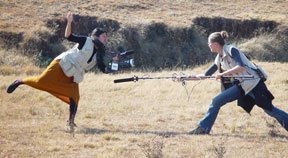 As hard as I've been on the hospital, they came through this past week Despite the interdepartmental communication problems that plague just about every department of health on earth, I have to mention how they're terribly understaffed for the scale of this epidemic; it's only fair to the kind doctors and nurses who really have been helpful. M. began ARVs on one of the coldest nights of winter here.
As hard as I've been on the hospital, they came through this past week Despite the interdepartmental communication problems that plague just about every department of health on earth, I have to mention how they're terribly understaffed for the scale of this epidemic; it's only fair to the kind doctors and nurses who really have been helpful. M. began ARVs on one of the coldest nights of winter here. 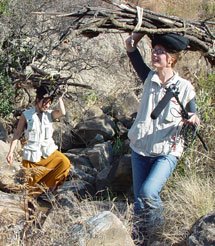 Fortunately, she lay warm beneath wool blankets in a hospital bed, while I buried myself in a sleeping bag and two comforters. We boil ourselves in hot baths before bed, to remind us that we have feet. You can sunbathe in skivvies by day, but nights are frigid in houses without insulation and heat. Thatched roofs are well insulated, and the smoke from the floor fires burnishes the grass and beams shiny black. It makes a beautiful finish. Mud bricks are laid for walls, and the smooth floors are mixed from clay and dung. Grass mats are unrolled to sit upon, and smell incredible.
Fortunately, she lay warm beneath wool blankets in a hospital bed, while I buried myself in a sleeping bag and two comforters. We boil ourselves in hot baths before bed, to remind us that we have feet. You can sunbathe in skivvies by day, but nights are frigid in houses without insulation and heat. Thatched roofs are well insulated, and the smoke from the floor fires burnishes the grass and beams shiny black. It makes a beautiful finish. Mud bricks are laid for walls, and the smooth floors are mixed from clay and dung. Grass mats are unrolled to sit upon, and smell incredible. 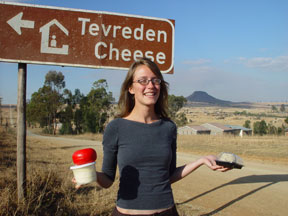 And you can see from Sarah's glowing photo that we visited the Tevreden Cheese Factory, in honor of the classic David Friedland song. We are wealthy in cheese! It was crucial—cheese sandwiches are our lunch four days out of the week, to keep the budget steady against the soaring price of petrol. And then come those golden afternoons when we are given enormous plates of home cooking...
And you can see from Sarah's glowing photo that we visited the Tevreden Cheese Factory, in honor of the classic David Friedland song. We are wealthy in cheese! It was crucial—cheese sandwiches are our lunch four days out of the week, to keep the budget steady against the soaring price of petrol. And then come those golden afternoons when we are given enormous plates of home cooking...
